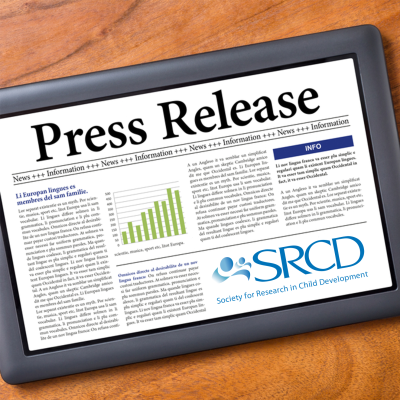Brain-Behavior Associations: Researchers Look at Ties Between Early Social Experiences and Adolescent Brain Function
PRESS RELEASE / 2013 SRCD Biennial Meeting: Embargoed for Release on April 18, 2013
Brains develop in the context of experience. Social experiences may be particularly relevant for developing neural circuits related to the experience of feeling or emotion. Factors such as negative life events and the quality of relationships may be especially influential.
Adolescence is a key time to investigate how early social experiences contribute to brain development because it’s a period of dramatic changes in brain function, brain structure, and social context, and it’s when many psychiatric disorders first appear. But few studies have addressed this important area because of the need for longitudinal data to investigate long-term associations between early social experiences and later brain development.
The Society for Research in Child Development (SRCD) will host a symposium during its Biennial Meeting to explore these issues. Researchers will present work based on four large, longitudinal studies of high-risk adolescents from varied socioeconomic backgrounds and nationalities. Among the questions that will be addressed:
- What early social experiences—including victimization by peers, warmth of caregivers, negative life events, and emotional abuse—affect brain development?
- What can we learn from functional neuroimaging, a technology that measures different aspects of brain function, conducted while teens watch videos, interact with peers, and experience rewards, such as winning money?
- How do early social experiences affect the functioning in adolescence of different brain regions, including the amygdala, orbitofrontal cortex, striatum, and medial prefrontal cortex?
The symposium will take place in the Sheraton Seattle Hotel, Redwood AB, on Thursday, April 18, 2013, from 10:20 to 11:50 a.m.
Researchers: Erika E. Forbes, Melynda D. Casement, Alison Hipwell, Samuel Musselman, Daniel Shaw, Stephanie Sitnick, University of Pittsburgh; Kathryn E. Keenan, University of Chicago; Amanda E. Guyer, University of California; Sarah Whittle, Murat Yücel, Julian G. Simmons, Nicholas Allen, University of Melbourne; Lisa Sheeber, Oregon Research Institute; Kathryn A. Degnan, Nathan A. Fox, University of Maryland; Johanna M. Jarcho, Daniel S. Pine, Eric Nelson, National Institute of Mental Health; Koraly Perez-Edgar, The Pennsylvania State University


